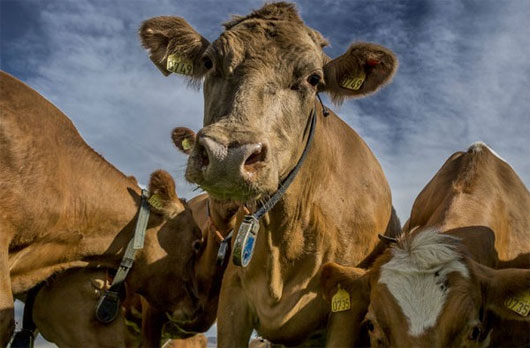Detection of 'toxic to humans' gene in cow dung
New research indicates that cow dung contains large amounts of antibiotic resistance genes that pose a serious problem for humans. Cow dung is often used to make plant fertilizer that contains a large number of antibiotic resistance genes (AR).
These genes come from cows' intestinal bacteria and, according to experts, are likely to infect the food and harm people.
Scientists from Yale University (USA) took cow dung samples from dairy cows on a farm in Connecticut. In the samples collected, the team discovered 80 antibiotic resistance genes (AR) and three-quarters of them had a different gene sequence from the previously discovered AR genes . These genes form a strain of E.coli resistant to many famous antibiotics including penicillin and tetracycline.

The team said that they were surprised by the antibiotic resistance gene AR found based on only five fecal samples from cows.
Researcher, biologist Jo Handelsman of Yale University said: "With only 5 small stool samples we have discovered many new antibiotic resistance genes. This will help us have a database. Genetics to conduct further studies to see if this antibiotic resistance gene can enter humans. "
Experts predict that the ability of AR genes to penetrate humans through two pathways - the bacteria that carry the gene directly into the gene or the gene is transferred across to another bacterium before "attacking" the human . When bacteria get antibiotic resistance, this causes serious problems for human health.
Professor Matthew Cooper of the University of Queensland said: "Antibiotic resistance in livestock is a global problem because when a large amount of food will be exported abroad, it increases the risk of replicating antibiotic resistance genes in too much water".
The study is published in mBio, an online magazine of the Microbiology Association.
- Detection of gene variants related to longevity in humans
- India develops arsenic detection techniques
- Detection of new breast cancer gene
- Gene regulates negative reactions in humans
- Detection of genes associated with crime
- Brain Gene creates people
- Discover a new gene in humans
- Producing electricity from the Black Sea's toxic gas
- 3 beautiful places are told in swordplay Kim Dung
- Humans can live up to 500 years by snail gene
- The American way of forecasting, detecting and measuring red tide toxins
- Why don't all primates evolve into humans?
 The United Nations' all-human warning: All antibiotics are becoming useless
The United Nations' all-human warning: All antibiotics are becoming useless How did bacteria learn to fight antibiotics?
How did bacteria learn to fight antibiotics? 10 million deaths are one of the startling numbers about 'Antibiotic resistance'.
10 million deaths are one of the startling numbers about 'Antibiotic resistance'. 7 principles when using antibiotics
7 principles when using antibiotics Found antibiotic resistance genes in clouds
Found antibiotic resistance genes in clouds  Antibiotics 'transform' themselves - New weapon against drug resistance
Antibiotics 'transform' themselves - New weapon against drug resistance  Air pollution increases the risk of antibiotic resistance
Air pollution increases the risk of antibiotic resistance  Students find antibiotic adsorbent from medical wastewater
Students find antibiotic adsorbent from medical wastewater  AI found a new super antibiotic that can kill the most dangerous antibiotic resistant bacteria
AI found a new super antibiotic that can kill the most dangerous antibiotic resistant bacteria  The CDC report states: The United States has entered a post-antibiotic period
The CDC report states: The United States has entered a post-antibiotic period 